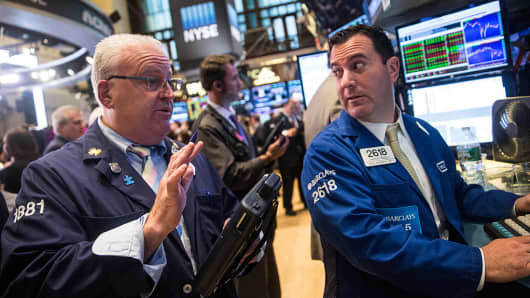Earnings from several major retailers and monthly retail sales data put the focus on consumers in the week ahead, but the bigger market events could be developments on NAFTA trade talks and a parade of Fed speakers.
Trade could be very important, as House Speaker Paul Ryan has now sought a deadline of May 17 for word of a new North American Free Trade Agreement. He said Congress will need to be notified by then in order to approve it.
U.S., Canadian and Mexican trade officials held week-long talks through Friday, and their staff will be working through the weekend. Top negotiators said they would resume discussions again, ahead of Ryan's Thursday deadline. U.S. Trade Representative Robert Lighthizer said the teams will remain "fully engaged," but it is clear that differences remain.
"The most disruptive thing we could hear next week is negative news out of trade talks. ... I still think NAFTA is more important than China now, and right now we have an artificial deadline," said Art Hogan, chief market strategist at B. Riley FRB. "I think that's going to dominate discussion next week."
Strategists have said it would be a positive for markets if the NAFTA talks are concluded successfully with a revised agreement, since it ultimately may be an easier negotiation than the issues with China, particularly over intellectual property.
"I would have thought you would have been closer to a deal here, I think, particularly since this is the first and theoretically easiest of the lot. You then have China and everybody else," said Hogan.
There are also appearances by a half dozen Fed officials, including San Francisco Fed President John Williams, who speaks Tuesday and Fed Governor Lael Brainard on Friday. St. Louis Fed President James Bullard appears on CNBC's "Squawk on the Street" Monday at 10:30 a.m. ET.
"That's the key. You're going to have a saloon-full of Fed speakers that may give you some hint of how worried they are about inflation. Do they see it as up to their target?" said Art Cashin, director of floor operations at UBS.
Inflation data in the past week was weaker than economists expected, and that kept the debate going about whether the Fed will hike two or three more times this year. The core consumer price index, before energy and food, was up 2.1 percent over last year in April, above the Fed's target of 2 percent. But the Fed's preferred inflation measure, the PCE deflator, has remained below 2 percent.
Wall Street is fairly well divided over whether the Fed will raise interest rates once a quarter, as it has been doing, or just three times this year, as it has forecast.
Monthly retail sales should be the highlight of the week's data Tuesday morning, and traders will also be looking for readings on consumer attitudes from Home Depot when it reports earnings Tuesday, Macy's on Wednesday and Walmart on Thursday.
The focus will also remain on geopolitical events, after President Donald Trump withdrew the U.S. from the Iranian nuclear agreement in the past week. Exiting the deal leaves the U.S. at odds with Europe and other parties to the deal, who will try to keep it in place. It may also increase tensions in the Middle East, which are already boosting oil prices.
West Texas Intermediate crude futures ended the week up 1.4 percent, at $70.70 per barrel, for the fourth positive week in five.
There will also be attention on upcoming talks between Trump and North Korean leader Kim Jong Un in Singapore next month.
"I think when he gave up the hostages that made a big difference," said Cashin, of the release of three Americans by North Korea in the past week.
Cashin said while the headlines should look positive for Trump and the markets, the winner, if there is an agreement on North Korea's nuclear weapons, will be China.
"[Chinese President] Xi [Jinping] will have bigger influence on South Korea and bring them into his orbit," said Cashin.
Stocks in the past week racked up solid gains, sparked by a revival in tech names after earnings. The S&P 500 was up 2.4 percent to 2,727 and is now positive for the year again, with a 2 percent gain.
